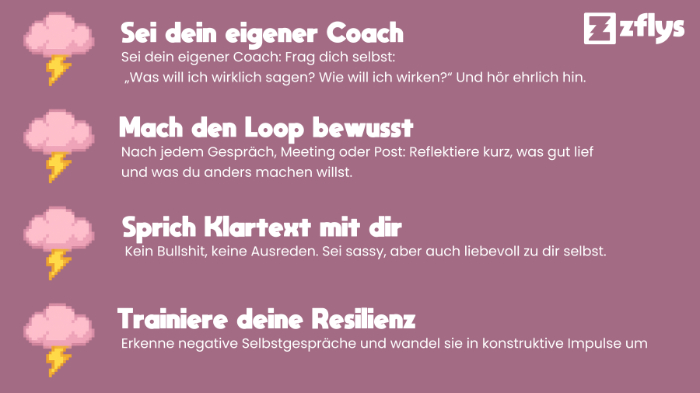Your inner superhero
The inner dialogue — your communication power plant
Hey, yes, you! Have you ever caught yourself silently debating with yourself, motivating yourself, or giving yourself a pat on the back? Or maybe even really scolding yourself? Welcome to the club! Because self-talk isn’t just some random chatter in your head — it’s the engine of your communication, your personal coach, and sometimes your toughest critic.
When you meet yourself with clarity and awareness, you can shape your messages much more precisely. You know what you want, what you feel, and how you want to express it. Without this inner dialogue, you’re like a ship without a compass — aimless and vulnerable to every wave.
The outer dialogue — the loud echo of your inner voice
The outer dialogue is what you share with others: conversations, meetings, emails, social media posts. It’s the visible result of your inner dialogue. If your inner dialogue is chaotic or negative, it will quickly show up in your external communication. Conversely, a clear, intentional inner dialogue turns you into a strong, authentic communicator.
Why self-talk is indispensable in a hybrid world

In the hybrid world we live and work in, the boundaries between analog and digital, private and professional, human and machine become blurred. Communication happens on many levels at the same time — in person, virtually, in writing, nonverbally, paraverbally. And this is exactly where self-talk becomes the superhero.
How does that influence our everyday business life?
1. Self-talk as an anchor in the digital flood
Between Zoom calls, Slack messages, emails, and social media posts, it’s easy to lose track. A conscious inner dialogue helps you set priorities, organize your thoughts, and avoid getting lost in the flood of information. You become the captain of your communication ship — someone who knows when to accelerate and when to pause.
2. Self-talk as a filter for authenticity
In the hybrid world, authenticity is worth gold. People instantly notice when you’re not being real. Your inner dialogue is the filter that tests your messages for authenticity. When you stay true to yourself, it shows on the outside — and creates trust and connection.
3. Self-talk as a resilience booster
Communication in hybrid teams and organizations is often complex and challenging. Misunderstandings, missing nonverbal cues, technical glitches — all of that can be frustrating. A strong inner dialogue helps you stay calm, reflect, and respond constructively. You strengthen your resilience and remain capable of taking action.
4. Self-talk as an engine of innovation
Hybrid also means: exploring new paths, questioning the old, staying flexible. Your inner dialogue is the space where you experiment, develop ideas, and challenge yourself. That’s where innovation begins — in your mind, before it later shows up in your external communication.
Consciously strengthening your inner dialogue — zflys style
At zflys, we’re convinced: communication is a living loop that begins with you.
Here are a few cheeky tips to take your self-talk to the next level:

Self-talk is your communication magic
In the hybrid world, self-talk isn’t a nice bonus — it’s an absolute must-have. It’s the starting point for clear, authentic, and effective communication. It keeps the Communication Loop running and prepares you for the challenges of today and tomorrow.
So stop talking only to others — start truly talking to yourself. Bold, honest, intentional. Because only those who understand themselves can truly reach others.
Table of contents
EUREKA! Do you have questions?
Does everyone really talk to themselves?
This can take many forms — from weighing decisions to processing emotions or solving problems.
How do self-talks in a business context differ from personal self-talk?
How can leaders use self-talk as a leadership tool?
This allows them to lead with more clarity, presence, and authenticity — resulting in more inspiring and effective leadership.
How does self-talk influence interpersonal communication?
Self-talk can enhance self-awareness, which leads to more authentic interpersonal relationships.
It helps you understand your own needs and emotions more clearly, making it easier to respond to others with empathy, clarity, and genuine connection.
Takeaways

Communication isn’t a one-way street — it’s a living cycle of sending, listening, understanding, and evolving. And this is exactly where self-talk plays a key role.
Because before you send anything outward, an internal dialogue takes place. You listen to yourself, reflect, rephrase, adjust. After sending comes the feedback — digital or analog — and the loop begins all over again. Without a conscious inner dialogue, this loop stays open, incomplete, and ineffective.

